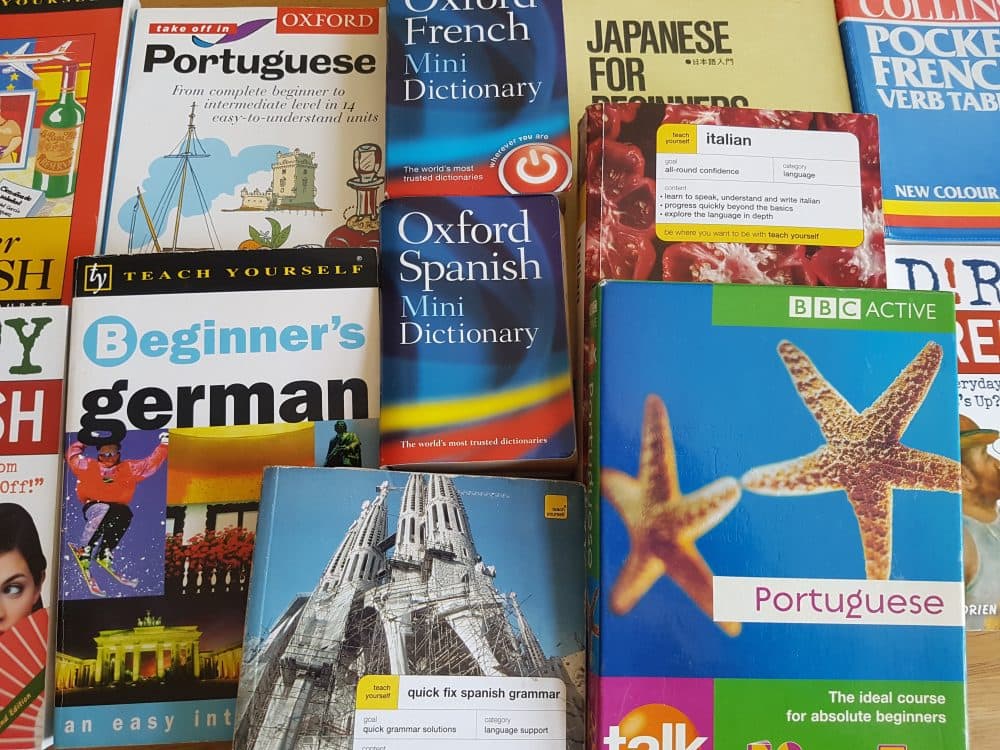Advertisement
Speaking My Language
These Polyglots Have Tips For How To Learn As Many Languages As You Want
Resume
Polyglots are people who speak multiple languages.
As part of our weeklong series on language, Here & Now's Jeremy Hobson hears from two of them: Shannon Kennedy from Orange County, California, who knows nine languages, and Steve Kaufmann from Vancouver, British Columbia, who knows 16.
Between the two of them, Kennedy and Kaufmann speak English, French, Mandarin, Korean, Croatian, Russian, Italian, Spanish, German, Japanese, Polish, Ukrainian, Swedish, Cantonese, Arabic, Romanian and Greek.
Kennedy (@eurolinguistesk), who runs a language-learning blog, says her interest in the subject ramped up when she went for her master's degree.
"One of the requirements for the program was to have fluent reading ability in Italian, Spanish, German and French, and I took that requirement very seriously," she says. "I realized that I really enjoyed learning languages. So once I graduated from university, I just continued to do it after."
For Kaufmann (@lingosteve), the fascination with language also began as a young adult, when he spent three years studying in France.
"Then I started working for the Canadian government, and I was sent to Hong Kong to learn Mandarin Chinese," says Kaufmann, co-founder of LingQ, a community of language learners and tutors. "And what happens is, once you discover that you can learn languages, I think people like to do things that they're able to do, that are a bit of a challenge and yet they're able to overcome the challenge.
"Once you know you can do it, it's fun, it's rewarding, you want to do more of it."
Tip No. 1: Enjoy The Process
"The process of discovering a language is, or should be, enjoyable," Kaufmann says. "So you've got to find an enjoyable way of doing it, and along the way, you discover these things, you discover similarities with other languages, similar structures or uniquely clever and elegant ways that some languages say certain things.
"The process has to be enjoyable, as well as the ultimate goal of being able to access other cultures and communicate with people from different countries and cultures."
"For me, there's lots of little aspects about different languages that kind of keep you engaged," Kennedy says. "One of my favorite things is tearing apart Chinese characters — they have all these different elements and different pieces that mean different things, and seeing how those work together to mean something ... I find that fascinating."
Tip No. 2: Age Is Just A Number
"I think your want for learning that language is what matters most, your desire to learn it," Kennedy says.
"I have learned half of [the languages I speak] since the age of 60. I'm 72 now. I think I learn languages better today than I did when I was 20," Kaufmann says. "I can't stress this enough, that the attitude, motivation, confidence that you can do it — all of these sort of attitudinal things are much more important than any innate talent, age, etc."
Tip No. 3: It's OK To Make Mistakes
"If you don't want to sound like a fool, don't learn foreign languages," Kaufmann says. "We think we are, or many of us, think that we're eloquent or intelligent in our own language, and inevitably we're less intelligent or less eloquent in another language. That just comes with the territory."
Which Language Had The Steepest Learning Curve?
"I think the one that's challenged me the most has been Korean," Kennedy says.
"Korean is very difficult," Kaufmann says. "I found Korean difficult."
This article was originally published on July 17, 2018.
This segment aired on July 17, 2018.